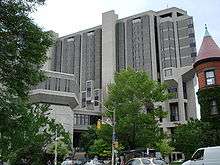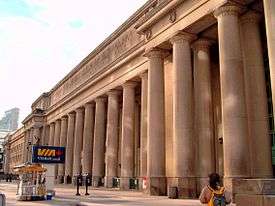Public services in Toronto
Public services in Toronto are funded by municipal property taxes, financial transfers from the Government of Ontario and Government of Canada, or are operated and financed by the higher-level governments. Funding for services provided by the municipal government is determined by a vote of the Toronto City Council in favour of the year's proposed operating budget; Toronto's operating budget in 2007 was $7.8 billion, and its capital budget was 1.43 billion.
Operational finances
Revenue sources for the city's operational budget consist of transfers and subsidies from the provincial and federal governments ($1.944 B), user fees ($1.205 B) and withdrawals from the reserve fund ($0.5 B). Property taxes represent 42% of the budget ($3.221 B), which is referred to as the Net Operating Budget.[1] All other sources total approximnately $1.0 B.
The most significant expenditures are:
- Police Services Board (24.4% of expenditures)
- Debt financing (12.2%)
- Fire services (10.4%)
- Social services (8.4%)
- Shelter, Support and Housing Administration (8.0%)
- Toronto Transit Commission (includes WheelTrans service) (7.4%)
- Parks, Forestry and Recreation (7.0%)
- Transportation services (5.7%)
- Solid Waste Management services (5.7%)
- Toronto Public Library (4.6%)
All other services individually represent less than 2% of expenditures.[1]
Education

Although private schools are plentiful in Toronto, most students receive their education via the public school system, operated by school boards funded by the province via provincial income tax and federal financial transfers to the provincial government. The Toronto District School Board (TDSB) operates 451 public schools and 102 secondary or high schools, the Toronto Catholic District School Board manages the city's publicly funded Roman Catholic schools, while the Conseil scolaire de district du Centre-Sud-Ouest and the Conseil scolaire de district catholique Centre-Sud manages public and Roman Catholic French-language schools.
The University of Toronto, established in 1827, is a leading public research institution and a worldwide leader in biomedical research. York University, another institution located in Toronto, houses the largest law library in the Commonwealth of Nations. The city is also home to Ryerson University, Ontario College of Art & Design, and the University of Guelph-Humber.
There are five diploma-granting community colleges in Toronto: Seneca College, Humber College, Centennial College, Sheridan College and George Brown College. The Royal Conservatory of Music, which includes The Glenn Gould School, is a major music school located in downtown. The Canadian Film Centre is a film, television and new media training institute founded by filmmaker Norman Jewison.
The city operates an extensive library network. The Toronto Public Library is the largest public library system in Canada and the second busiest (by number of visits) in the world after the Hong Kong Public Library.
Recreation
There are numerous recreation areas owned and operated by the city, including swimming pools, bicycle and jogging trails, and parks. It also operates the Toronto Zoo and other public spaces, such as Nathan Phillips Square and Downsview Park.
Health

Health services in Toronto are quite extensive, and benefit from the intensive and broad medical research conducted in the city. Hospitals are publicly financed, primarily by the provincial government, but also via federal government transfers to the province, some private sources (e.g. - lotteries) and through charitable and philanthropic donations.
Family doctors have private practices funded by the provincial government. Paramedic and ambulatory services are funded by the city. Also, non-profit palliative care services exist.
Transportation

Various modes of transportation are available in the city. Operation of the Toronto Transit Commission is funded by the municipal government and user receipts, but infrastructure projects may receive funding from provincial and federal sources.
Roads within the city are a municipal responsibility, but major highways, such as the 400-series highways, are provincially funded and operated. In the winter, the city provides snow removal services on its roads and on property it owns, such as parking lots at libraries and swimming pools.
Water and wastewater
Toronto has a vast network to manage water delivery and to process wastewater.
Waste management
The city's waste is collected by private operators under contract to the city. Some businesses make separate arrangements for their waste, as do hospitals for some of their waste. Collection includes garbage, recyclable materials, and compostable materials. Hazardous waste is also handled separately. The city's green bin program for compostable material was first tested in parts of Etobicoke, a suburb in the northwest.
Law enforcement
The Toronto Police Service is one of the oldest English-language modern municipal police departments in the world. Its operational is funded via the municipal government, and represents the single-greatest yearly expenditure in the city's operating budget.
Emergency services
Emergency services in the city include paramedic and ambulatory services, as well as fire services.
References
- 1 2 "2007 City of Operating budget of $7.8 billion approved by Council" (PDF). City of Toronto. pp. 1–3. Retrieved 2007-08-07.